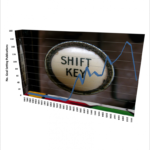What sorts of personalities perform best at work? It is a question that seemingly all of us have an opinion about, but this deceptively simple question has no straight answer. Organisational psychologists often use five personality labels to describe the differences in people’s temperament. They are Extroversion, Conscientiousness, Openness to Experience, Agreeableness and Emotional Stability. Collectively they are called the Big Five. The Extrovert is outgoing and has high levels of energy to make things happen, the Conscientious type works diligently towards a goal, the Open type is a flexible and creative thinker, the Agreeable type is warm and easily makes friends, and the Emotionally stable type is even-tempered and resilient in the face of stress.
The nature of the job also plays a big part in determining what personalities might succeed. For instance people who are in the early stages of a new job, or those dealing with a job that has changed or is continually changing may face quite different challenges to those who are trying to maintain a level of performance having established themselves in an unchanging role. To make matters worse it is very likely that differences in personality will influence how people perform in these different stages of their work.
When advising clients about changing jobs, I encourage them to consider whether they are Builders or Maintainers. The Builders are people who like to take new challenges and create something from where nothing existed before. Maintainers are people who are not driven by the need to build something brand new. Maintainers are much more likely to find their challenge in keeping something going well, avoiding trouble, elongating the life of something. Put a Builder type in a Maintenance role and they might deliberately undermine the process just to give them the challenge to build it up again. Put a Maintainer in a Building role, and marvel at the total lack of progress!
Carl Thoresen from Tulane University and his colleagues Jill Bradley, Paul Bliese and Joseph Thoresen reported recently in the Journal of Applied Psychology, a very clever study that demonstrated the truth in the Builders and Maintainers argument. They used the terms “Maintenance pattern” for people in unchanging roles and “Transitional pattern” for those in new and changing roles. They studied 99 pharmaceutical sales staff who were in a maintenance pattern of work (they promoted a range of primary care products and had done so for some time) and 78 who were in a transitional stage (they were launching a brand new hormone replacement medicine and their pay was related to their success with this new product). They found that high levels of Conscientiousness and Extroversion predicted high performance of those in the unchanging (Maintenance) roles but high levels of Openness to experience and Agreeableness did not. For the changing role (Transitional) employees it was exactly the opposite: high levels of Extroversion and Conscientiousness did not predict performance, but high levels of Openness to experience and Agreeableness did.
So different personalities may be successful at work at different times and under different work conditions. When the work is unchanging and the employee may be susceptible to complacency, the energy of an extrovert who is also very dependable and reliable (conscientious) is required to keep up the performance levels, whereas, if the job is undergoing change, then an employee who is creative and a flexible thinker (openness to experience) who is also able to create new and warm relationships and get their foot in the door (agreeableness) perform better.
To understand why you are performing or feeling the way you are in your current role, it is a good idea to consider your personality and also the nature of the role you are in or the one you are considering moving to. The good news is that there is no one ideal personality for work success, it is a case of finding a role that suits yours.
This article by Jim Bright originally appeared in Jim’s column, The Ladder in the Sydney Morning Herald
Related Posts






